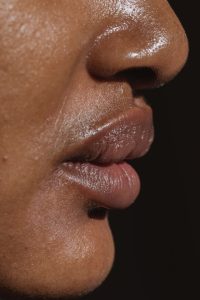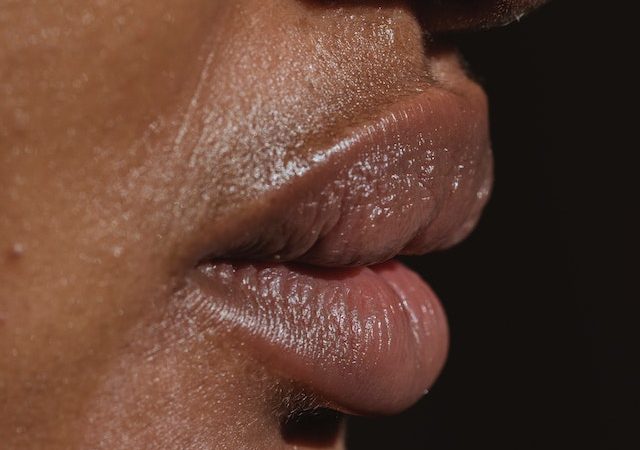Introduction: Coping with excess oil on the T-zone, specifically a glossy nose, can be quite exasperating. An overproduction of oil in this area can cause a shiny look and cause makeup to smear and melt. Nonetheless, there are various strategies and methods that can assist you in maintaining a matte nose and achieving a harmonized
Introduction:
Coping with excess oil on the T-zone, specifically a glossy nose, can be quite exasperating. An overproduction of oil in this area can cause a shiny look and cause makeup to smear and melt. Nonetheless, there are various strategies and methods that can assist you in maintaining a matte nose and achieving a harmonized complexion. This extensive guide will delve into the difficulties of dealing with excess oil in the T-zone and offer effective strategies to control oiliness.

Photo by Angela Roma : https://www.pexels.com/photo/crop-ethnic-model-with-imperfect-skin-on-black-background-7479955/
Developing a Daily Skincare Routine for Oily Skin:
Use a mild and oil-free cleanser specially designed for oily skin to clean gently. Wash your face morning and evening, focusing on the T-zone area. Refrain from using harsh cleansers that remove natural oils, as they can stimulate excessive oil production.
Regularly exfoliating the skin helps eliminate dead skin cells and clear out pores.
Opt for a mild exfoliating product that contains salicylic acid or glycolic acid. To prevent excess oil accumulation and reduce the visibility of blackheads, concentrate on caring for your nasal area.
Hydrating oily skin is important, so opt for a lightweight and non-comedogenic moisturizer that doesn’t contain oil. Seek out products containing hyaluronic acid or glycerin for moisturization without increasing oiliness.
Sun Protection:
Use a sunscreen that offers both UVA and UVB protection and has a non-greasy or mattifying formula. Using sunscreen can shield the skin from damaging UV rays and also prevent excessive oiliness and potential harm to the skin.
Ways to Manage Oil Production in Your Skin:
1. Cleansing: Wash your face twice a day with a gentle cleanser to remove excess oil and dirt. Avoid using harsh cleansers that can strip away natural oils, as this can actually lead to increased oil production.
2. Exfoliation: Regular exfoliation helps remove dead skin cells and unclog pores, which can help control oiliness. Use a gentle exfoliator 1-2 times a week to avoid over-drying the skin.
3. Moisturizing: Contrary to popular belief, even oily skin needs moisture. Opt for lightweight, oil-free moisturizers that provide hydration without adding extra shine.
4. Sun protection: Protect your skin from harmful UV rays by using sunscreen daily. Look for non-comedogenic formulas that won’t clog pores or contribute to excess oil production.
5. Balanced diet: A healthy diet rich in fruits, vegetables, and whole grains can help regulate oil production from within the body. Avoid greasy and sugary foods, as they can exacerbate oily skin.
6. Hydration: Drink plenty of water throughout the day to keep your body hydrated and support overall skin health.
7. Stress management: Stress can trigger hormonal imbalances that lead to increased sebum production in the skin. Practice stress-reducing techniques such as meditation or yoga to keep stress levels in check.
8.Cleansing habits before bed : Make sure you cleanse your face properly before going bed this will prevent clogged pores during while you sleep
9.Watch out for harsh chemicals : Be careful with products containing harsh chemicals like alcohol , sulfates , parabens because they cause stripping of moisture from your face causing more sebum being produced
10.Avoid touching too much : Touching with dirty hands transfers bacteria onto our faces causing acne hence excessive sebum
Ensure your diet consists of a variety of fruits, vegetables, and whole grains to maintain a balanced eating plan. Limit your intake of greasy or fried foods to prevent excessive oiliness. Make sure to drink enough water each day to stay properly hydrated.
Stress has the ability to disrupt hormone balance and stimulate excess oil production on the skin. Engaging in stress management techniques such as exercising, meditating, or pursuing hobbies can help decrease stress and control oily skin.
Avoid Touching Your Face. Rubbing your face with dirty hands can cause acne and make your skin oilier. Minimize touching your face without reason and maintain good hand hygiene.
Conclusion:
Maintaining a balanced T-zone and preventing oiliness on the nose necessitates establishing a regular skincare regimen, utilizing specific treatments, and making necessary lifestyle changes. By acknowledging the difficulties of having an oily T-zone, creating a consistent skincare regimen, applying specific treatments, and adopting healthy habits. You can successfully control excess oil and attain a harmonized skin tone. Follow these suggestions and bid farewell to an oily forehead forever.

















Leave a Comment
Your email address will not be published. Required fields are marked with *